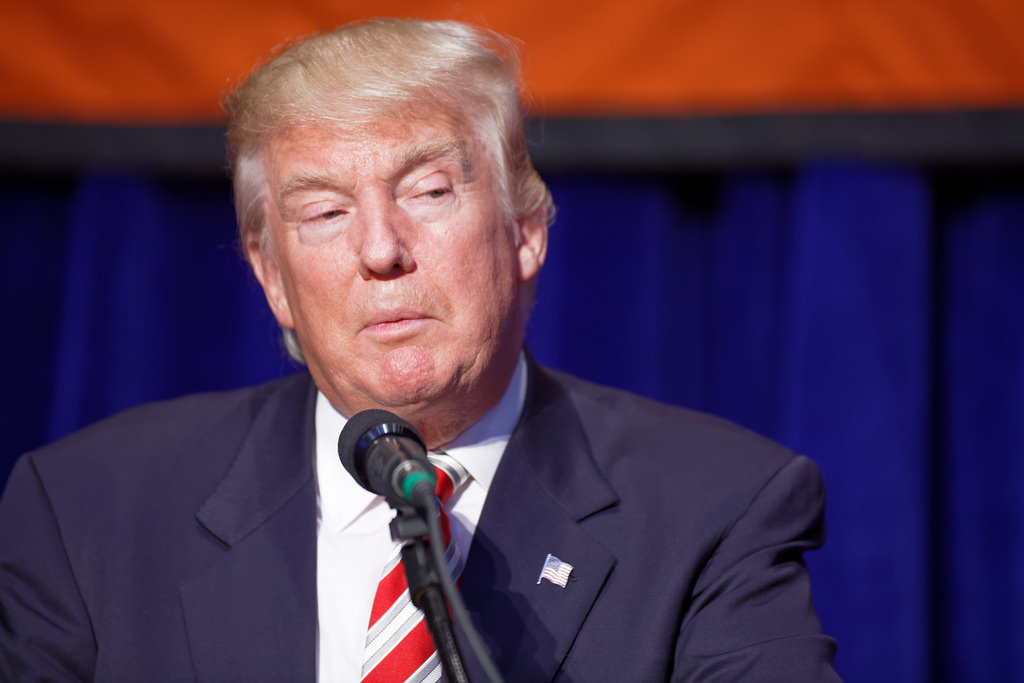Waves of heroic protests have spread rapidly to towns and cities throughout Iran over the past two weeks. This was a spontaneous eruption of rage by the lower-middle-class and working-class youth against poverty, rising prices and destitution, as well as against the wealth and corruption of the Iranian elite – particularly the clerical establishment. It is estimated that 21 people have been killed in the protests so far and over 1,700 arrested. Immediately, Western leaders from Washington to London raised a chorus defending the human rights of the Iranian people.
In his inimitable style, the same Donald Trump who has close relations with the reactionary Saudi regime declared that “the world is watching!”, demanded that the human rights of Iranians be respected and said that “you will see great support from the United States at the appropriate time!”. The Canadian minister of Foreign Affairs released a statement calling on “Iranian authorities to uphold and respect democratic and human rights.” UK Foreign Secretary Boris Johnson expressed his concern for the loss of life and called for human rights to be observed.
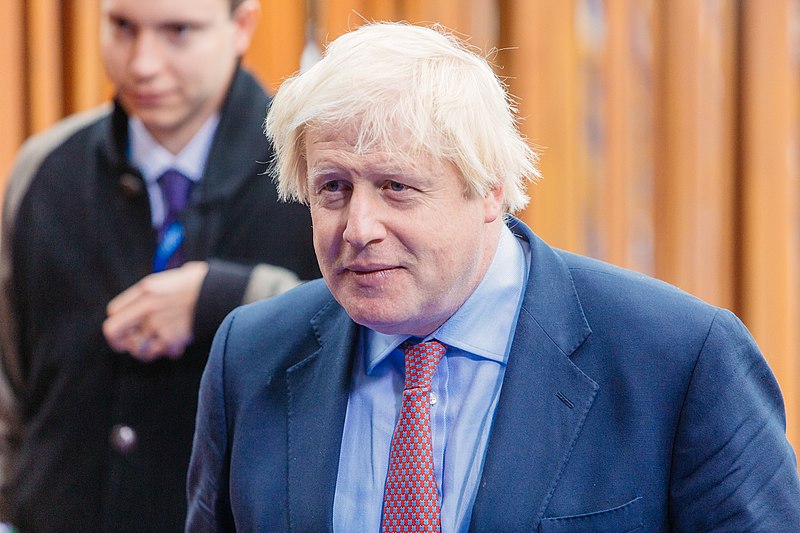 Boris Johnson hypocritically called on Iran to respect human rights / Image: Arno Mikkor
Boris Johnson hypocritically called on Iran to respect human rights / Image: Arno Mikkor
With a slight delay, EU foreign policy chief Mogherini and French President Macron joined the fray calling for democratic rights to be respected. The US ambassador to the UN reported on 2 January that the US was seeking an emergency meeting of the UN Security Council and the UN Human Rights Council as a result of the killing of protesters in Iran.
Brutal economic sanctions by US and EU
The declarations of support from Western leaders cannot help but leave a bitter taste in the mouth of the protesters. The US and Western European powers have pursued a policy of brutal sanctions against Iran for decades, which intensified into a near-complete embargo in 2012.
The most recent intensification of sanctions, falling at the same time as the world economic slump, caused a deep crisis in the Iranian economy. Exports from Iran’s main industry, oil, collapsed from about 2.5 million down to 1 million barrels a day. Production in the automobile sector, which is the second-largest employer in the country, fell by nearly 60 percent. The Iranian economy contracted significantly during this time, shrinking by about 9 percent between March 2012 and March 2014, largely because of shrinking oil production, factory and other private sector closures.
Unemployment rose to 20 percent in 2014, with the rate for youth being much higher. Millions of workers were laid off due to the embargo, and many more were left unpaid for many months or longer.
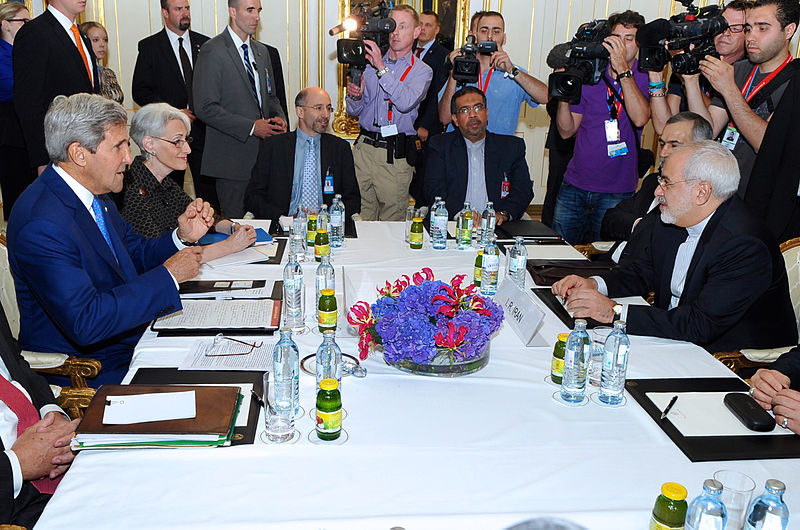 Negotiation of Iran nuclear deal in 2014 / Image: public domain
Negotiation of Iran nuclear deal in 2014 / Image: public domain
Prices for necessities like electricity, fuel, water increased by many times, as did food prices for bread, wheat and cooking oil. Access to medicines and medical equipment became severely limited, leaving many with serious illness and without treatment. The Iranian passenger air fleet was starved off parts, which had a serious effect on the safety of Iranian operated flights.
Large sections of the middle class were ruined as their businesses faltered and their savings became worthless. The sanctions regime imposed by the West was nothing short of devastating and humiliating to the Iranian people. Its purpose was to force Iran into submission. The impact was primarily felt by the workers, the poor and middle class. These are exactly the same sections of Iranian society that are protesting today.
The sympathy and support offered by Western leaders to protests that have erupted against inflation, poverty and unemployment cannot be understood as anything other than manipulative and hypocritical. These same powers carried out a policy to push the Iranian masses into a state of economic desperation and destitution for the sole purpose of asserting their dominance over Iran and the Middle-East.
After the 2015 nuclear deal the sanctions were supposed to have been lifted by the US, Canada and the European powers. Certain sanctions have been lifted, which allowed oil exports to increase significantly. Nonetheless, significant sanctions remain in place, especially by the United States.
It is notable that one of Trump’s electoral planks has been to rip apart the Iran Nuclear deal, and to pursue an aggressive economic and military policy against Iran. Since taking the presidency, he has tightened a number of the non-nuclear sanctions despite the commitments of the 2015 deal. This has halted foreign investment into Iran, which was expected after the deal was struck.
US on the offensive
Behind Trump’s “sympathy” for the protests is an attempt to justify the reinstating and deepening of economic sanctions. Last October, Trump had already threatened to withdraw from the Iran nuclear deal, a decision that is to be made in the next couple weeks. If he fails to certify Iran’s compliance with the deal, it could result in new sanctions. An emergency meeting of the UN security council was called by Trump for 5 January, which was a blatant attempt to push for greater Western intervention against Iran.
But these protests were sparked precisely due to the economic hardship of the masses, which Trump is proposing to intensify. These criminal sanctions imposed by Western imperialism are not and should not be forgotten by the Iranian masses. The rhetoric of Western leaders in support for the ‘Iranian people’ has nothing to do with concern for the suffering of the Iranian people.
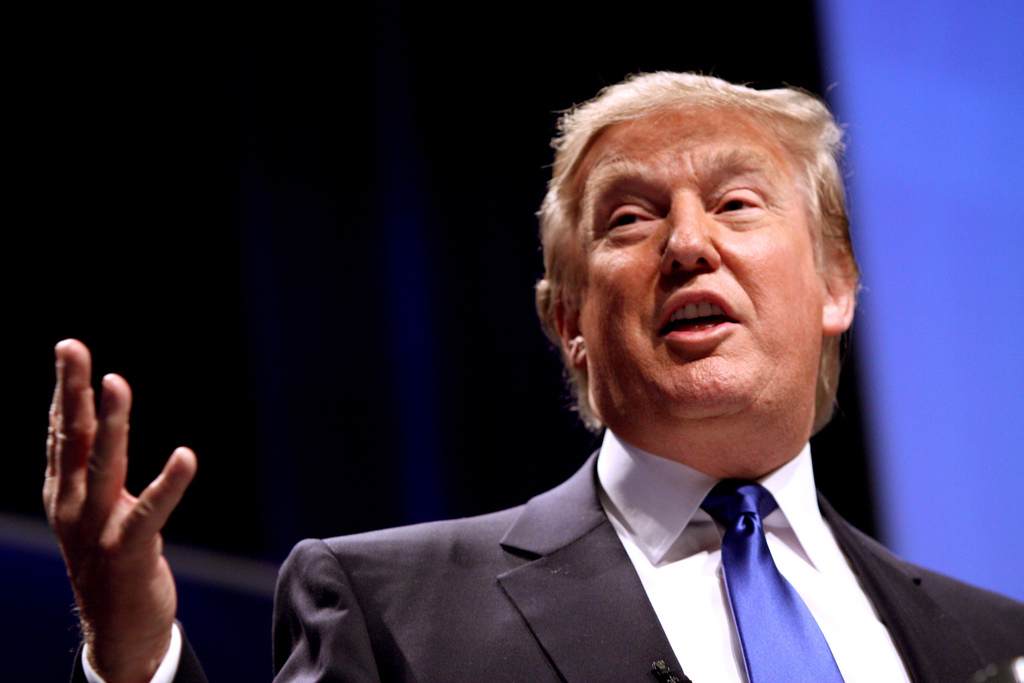 In October, Trump threatened to withdraw from the Iran nuclear deal / Image: Flickr, Gage Skidmore
In October, Trump threatened to withdraw from the Iran nuclear deal / Image: Flickr, Gage Skidmore
Even America’s European allies such as Britain and France were put in an uncomfortable position, warning Trump against ripping apart the 2015 nuclear deal and pursuing more punitive policies against Iran. Nevertheless, they still participated in the US’s lecturing of Iran on causing instability in the Middle-East and on democratic rights. Such is the hypocrisy of these world powers, who have launched war after war in the region. No doubt, the Iranian regime will try to use this hypocrisy to dissuade protesters from challenging their rule.
US and allies seek a regime-change
The US has been on the back foot as a result of the aftermath of its interventions in the Middle-East over the past 15 years. The invasion and occupation of Iraq destroyed the Iraqi army, which had served as a counterweight to the Iranians. As a result, the Iranian regime was able to expand its influence in the region, especially in Iraq. As a countermeasure, the US and its allies organised the hijacking of the Syrian Revolution by Sunni extremist forces. But the Syrian adventure also backfired, leading to a defeat, which further strengthened the position of the Islamic Republic in the region.
The disastrous US interventions in the region have had the opposite of their intended effect, weakening the US and its allies while strengthening Iran’s regional influence. The US, and especially the Saudis and the Israelis, fear this growing influence, and seek to destabilize Iran. They have been pursuing a tactic of regime change for a number of years. For example, the Saudis, the Turks and the Israelis have been trying to whip up nationalist tensions among the oppressed national minorities in Iran.
While these attempts to destabilize Iran do not present a danger at the present, they could at a later stage. Iran has emerged as a serious regional power, and the era where the US and its regional allies could do as they pleased has come to an end. Their demagogic appeals to the present mass movement are an attempt to establish a foothold in Iran. This means attempting to hijack the movement and push it in a reactionary direction.
In these attempts they so far have two stooges. On the one hand there is Reza Pahlavi: the last heir of the Anglo-American backed monarchic dynasty that was overthrown during the 1979 revolution. He has presented himself as the “unifying voice” of the Iranian opposition. He called for US assistance for the overthrow the Iranian regime. During a recent BBC radio, he advocated the setting up a constitutional monarchy following the collapse of the current regime.
The People’s Mujahedin Organization (PMOI) has also been seeking and gaining the support of Western imperialism. It is a reactionary Islamic terrorist organisation, which for years was based in Iraq. The group worked with the regime of Saddam Hussein during the Iran-Iraq war, and began to openly seek alliances with Western imperialism after that. It is believed to have increasingly close ties to Saudi Arabia. The PMOI was recently taken off the terrorist list in the EU in 2009 and the US in 2012. They have significant support among prominent Republicans as well as Democrats, and have called for a meeting with Trump this month. The regime claims to have arrested several of their members in the past week over attempts to organize sabotage.
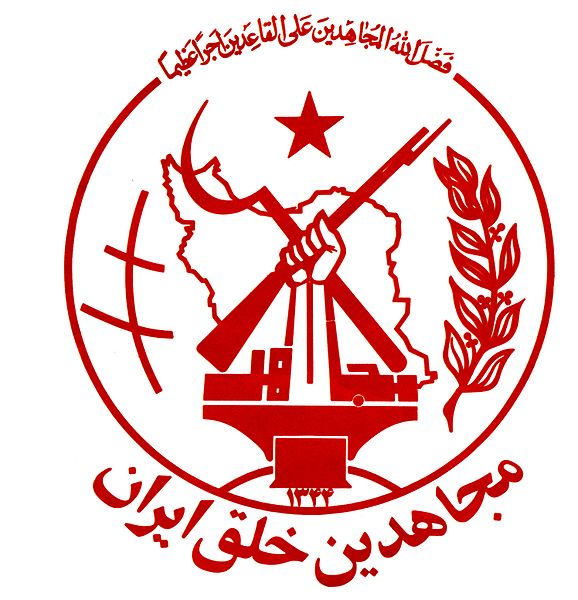 People's Mujahedin Organization of Iran / Image: Flickr, MEK People's Mujahedin Organization of Iran
People's Mujahedin Organization of Iran / Image: Flickr, MEK People's Mujahedin Organization of Iran
At the same time, an aggressive propaganda campaign has been established through the setting up of various US and British-based media networks targeting the Iranian population. Television channels such as Manoto, Voice of America and BBC Persian broadcast actively to an Iranian audience and are quite popular given the stifling censorship in Iran. These channels are correctly perceived as promoting regime change in the service of Western powers and promoting their proxies.
These Western-backed forces fortunately do not have much influence in Iran. They are, however, actively seeking to influence the present mass movement and to gain a foothold. It is therefore vital that the present mass struggle reject and push aside these reactionary pro-imperialist forces.
All the factions of the ruling Iranian regime are using this Western intervention to discredit the movement. In fact, one of the main reasons why the movement has not drawn in even broader layers is that many are wary of becoming pawns of US imperialism.
Imperialist hands off the protests in Iran!
The bloody track record of Western imperialism in Iran and the Middle-East is enough to show that it can play no progressive role whatsoever in the struggle of the Iranian masses against the regime. The history of plunder and brutal intervention of British and US imperialism in Iran throughout the 20th century, including the 1953 US-backed coup d’etat, the backing of the Iranian monarchy, and the support for Saddam’s invasion of Iran (including supplying chemical weapons) is well-known. The most recent economic war shows the real attitude of the imperialists to the impoverished and struggling masses.
US imperialism has brought sectarian bloodbaths and mass poverty to Afghanistan, Iraq, Libya and Syria. Western intervention can only have a reactionary impact on Iran. Having any illusions in US, Canadian or European imperialism could only throw back the aspirations of the Iranian workers and youth for economic security, democratic rights and an end to the dictatorial rule of a corrupt and wealthy elite.
The Iranian regime is well-aware that mass sentiment is hostile to Western imperialism. In fact, one of the key pillars of its rule has been the foreign threat posed by US imperialism. In the Middle-East in general as well, the Iranian regime has tried to position itself as an “anti-imperialist” force fighting against the reactionary groups spawned by US imperialism and Saudi Arabia.
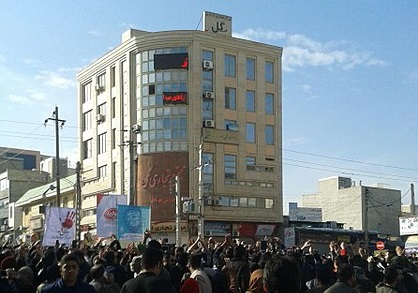 Iran Protests 2017 / Image: public domain
Iran Protests 2017 / Image: public domain
Khameini responded to the protests by claiming that “enemies of Iran” were behind them and that these forces were using their “money, weapons, politics and intelligence services” to promote the movement. Iran’s Foreign Minister and UN special envoy attacked Trump and other Western powers for their attempt to interfere in domestic affairs. The ‘reformist’ politicians, who are a part of the Iranian ruling regime, have been particularly aggressive in attacking the protesters and claiming that Western powers are behind the unrest.
In reality of course, the Mullah regime is not anti-imperialist at all. In fact, in Afghanistan and Iraq, Iran and the US have cooperated on many occasions. In Iraq, the US had become dependent on its alliance with Iranian-backed forces in the fight against ISIS and other Sunni Islamists. The Shia militias, Iranian troops and paramilitaries in Iraq have been the only reliable force preventing the disintegration of Iraq. Without Iran’s help, the defeated US occupation of Iraq would have been much more significant and costly.
Iran cooperated with the Americans during the occupation of Afghanistan and assisted in the toppling of the Taliban regime. The regime of Hamid Karzai, set up after the US invasion, was backed by and friendly to both the Americans and the Iranians. Financing for the regime was provided by both governments. In Syria as well, the Iranians have on several occasions offered to cut a deal with US imperialism. The Iranian regime’s ‘fight’ against Western imperialism is only a fight to be allowed to sit at the same tables and to get a share of the pie.
Nevertheless, as long as imperialist aggression continues against Iran, the regime is able to rally a section of the Iranian people behind it. The effect of the US, Israeli and Saudi campaign to promote their own imperialist agenda via the latest movements has had a corresponding effect of scaring certain layers away from it and thus weakening the movement.
That is a clear lesson for Iranian revolutionaries in the future. The masses cannot trust US imperialism or any other elements from the ruling class. They can only trust their own forces. The key to breaking the isolation of the present movement and to prevent it from degenerating, is to organise it and to reach out to the working class.
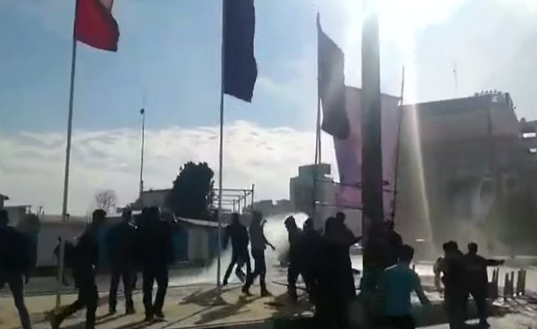 Iran Protests 2017 / Image: fair use
Iran Protests 2017 / Image: fair use
It is the duty of the socialist and labour movement in the West to oppose all intervention in Iran, including military intervention, economic sanctions, diplomatic manoeuvres and covert operations. The intentions of Western imperialism must be exposed throughout the labour movement.
Workers and youth in the West instinctively seek to forge links and organize solidarity with the heroic struggles in Iran. Many of the issues underpinning the protests in Iran – such as poverty, unemployment, corruption and inequality – are common to the working class across the globe. Our task in the West is to organize independent working class solidarity with the Iranian masses and actively mobilize the struggle against our own imperialist ruling class. At the same time, as internationalists, we must reach out to Iranian workers and youth to build a Marxist revolutionary tendency, which could lead the coming Iranian revolution.

